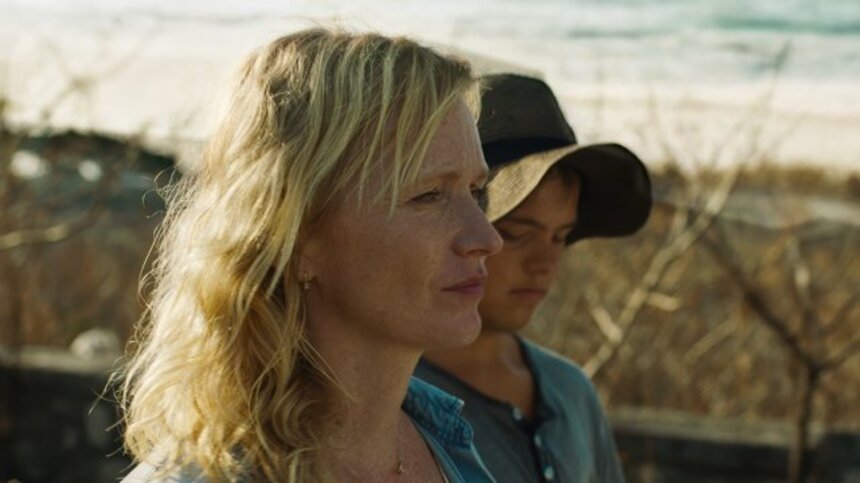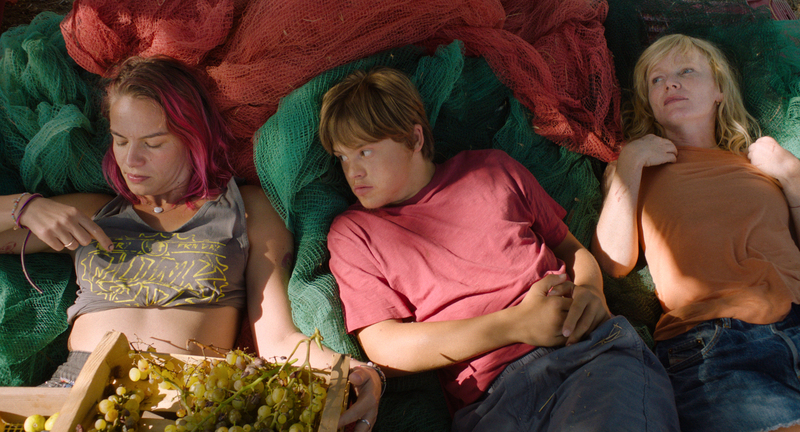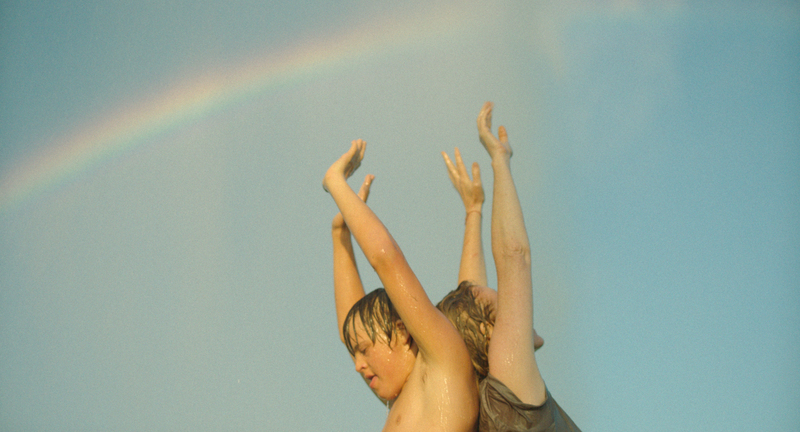Cannes 2025 Review: Duty and Desire Collides in CARAVAN in a Touching Portrait of Motherhood and Womanhood

The feature debut Caravan from Czech filmmaker Zuzana Kirchnerová follows a middle-aged mother and her disabled son on an unplanned road trip through Italy. After her son David (David Vodstrčil), who has down syndrome and autism, has a meltdown at a friend’s home in southern Italy, culminating in wrecked living room, Ester (Aňa Geislerová) impulsively takes her friend’s caravan and sets off without a clear destination, taking her son with her. The act is both a moment of rebellion and a release, driven by the exhaustion of her caregiving role, which has gradually eclipsed her own identity. As the journey unfolds, the road becomes a space for reprieve, if not resolution.
Kirchnerová’s 2009 short Bába won the Cinéfondation award at Cannes, which paved the way for her feature debut at the festival following her participation in L’Atelier de la Cinéfondation. Caravan builds upon Bába, as the short also centers on a caregiver, this time a teenage girl looking after her bedridden grandmother, exploring themes of resentment, fear, mortality, and the abrupt arrival of adult responsibility within a compressed narrative space.
Kirchnerová went on to work in documentary filmmaking before finishing her fiction feature debut, directing television docuseries such as Four of Us, The Magnificent Five, and Hospital on the Front Line, focusing on individuals whose lives are shaped by systems of care or neglect, and who must navigate their identities within restrictive social and institutional frameworks. In this regard, Caravan continues her sustained interest in topics of identity, care work, and social marginality.
Ester has long subsumed her identity into the role of caregiver. When a visit to friends in southern Italy becomes strained and David’s tantrum disrupts the household, Ester and David flee in the old caravan parked in the yard. The spontaneous escape becomes Ester’s tentative reach for a freedom she has not experienced in years, constrained as she is by the demands of caregiving. The initial surge of euphoria is amplified by the presence of Zuza (Juliána Brutovská), a young, free-spirited woman who joins them on the journey.
Zuza alters the dynamic in which Ester, as a single mother, has existed for so long. Through female friendship, shared moments of respite, and the partial release from her caregiving responsibilities, Zuza’s presence offers Ester a renewed sense of possibility during the course of the summer journey.
Crucially, Ester begins to reconnect with her suppressed sense of female desire, long overshadowed by the demands of motherhood and care. Caravan is, at its core, a psychological drama exploring motherhood and womanhood. While not autobiographical, the script is informed by Kirchnerová’s own experience as the mother of a disabled child, and she brings a distinctly female perspective to the character as she interrogates identity and personal boundaries.
The film opens on a dramatic note before transitioning into a road trip through sunlit Italian beaches, where Ester and her son experience a brief sense of unrestrained freedom. Kirchnerová broadens her characteristic narrative pacing; emotional shifts unfold gradually, at times almost imperceptibly. The film’s structure accommodates a range of tones, from muted comedy to understated romance, while the road movie framework functions as a clear metaphor: first for escape, then for transformation, and ultimately for a kind of realignment
The cinematography, attuned to the landscapes of southern Italy and the confined interiors of the caravan, favors natural light and restrained compositions. The camera stays close to Ester’s perspective, but occasionally shifts just enough to allow David or Zuza to emerge as temporary centers of emotional focus. This visual strategy reflects Ester’s internal uncertainty, her difficulty in articulating desire and her ambivalence toward a life beyond caregiving.
Caravan evokes the restrained naturalism of the Dardenne brothers and Andrea Arnold, combined with the pastoral lyricism of Alice Rohrwacher. Slovak cinematographer Denisa Buranová initially shot the film before handing over cinematographic duties to fellow Slovak DoP Simona Weisslechner, who continued in Buranová’s visual style.
The use of soft natural light and a lighter tonal palette lifts the road trip into a space where Ester momentarily experiences freedom, with scenes of seaside frolicking underscoring the sense of release. The creative team was predominantly female, a fact that resonates in the film’s perspective, particularly in its treatment of Ester’s reawakened sexual desire through a distinctly female gaze.
David, largely non-verbal and portrayed by non-professional neurodivergent actor, is never reduced to a plot device for Ester’s internal conflicts. Kirchnerová maintains a character arc for him as well, particularly through his growing connection with Zuza.
There remains a persistent stereotype in portrayals of characters with Down syndrome, one that directors like Jaco Van Dormael have worked to challenge. Kirchnerová avoids such simplifications, opting instead for a more observational approach in David’s scenes. Her direction leans toward a documentary sensibility, capturing both the emotional peaks and quieter struggles that indirectly reflect Ester’s own dilemmas.
This same approach, grounded, unsentimental, and attentive, applies equally to the film’s portrayal of (single) motherhood. As Ester gradually reclaims a sense of agency, so too does David. Their parallel journeys subtly reshape the mother-son dynamic, deepening the emotional resonance of their bond.
Caravan is less a film about disability than one about motherhood and the ways in which female identity is shaped by it. Kirchnerová neither idealizes maternal devotion nor pathologizes the desire to step outside its confines. Ester carries both responsibilities and desires, and the film navigates the tensions that arise between selfhood and duty, between love and exhaustion, and between the roles of mother, caregiver, and the woman that exists beyond them.
Caravan introduces socially sensitive and often overlooked subjects, yet Kirchnerová approaches the role and complexities of motherhood with a clear-eyed honesty that avoids stereotypes and shortcuts. While the story centers primarily on parenthood, the film holds thematic relevance beyond that framework, particularly as a coming-of-middle-age road movie that may resonate with a broader audience.
Caravan
Director(s)
- Zuzana Kirchnerová
Cast
- Anna Geislerová









